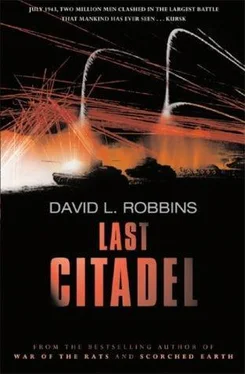Katya puzzled at the tale. It was fantastic, that anyone would say these things after being captured. This German was inventive, and plausible in his performance, quietly frantic. This was a plot out of an adventure book, a fiction about a swashbuckling spy. She gazed at the thin, dirty German wrapped in ropes on this plank floor. This was no hero.
‘I will turn you over to a commissar tomorrow evening, Colonel. That’s when I will let you go. You can tell him all your numbers then. You’ll be a great help. Russia will thank you appropriately, I’m sure.’
Filip translated this without the sarcasm from her tone. Breit grew urgent.
‘You can’t! I must get back to Berlin!’
Katya stood, feeling the whiplash of anger. This was enough of Breit; he was something she’d been curious about – an enemy brought close for a little while, for an afternoon and night in a remote village barn – but like a cave she’d wandered into, now she was far enough from the light at the opening to turn around and go back. She lacked the desire to delve farther. Tomorrow she would try to rescue Leonid, she may die in the attempt along with this German and the old starosta . She worried every day for Papa and Valentin, she grieved for Vera and too many others already. Where was the room in her for Breit’s pleading? If by any chance he was a spy, then he was a traitor to his own country, and the Cossack in her found that sour and wormy. If not, then he was just a liar and a coward. In either case, his story was not worth reporting to Colonel Bad. She would keep the prisoner’s secret, not because he asked her but because she would look foolish repeating it.
She was done with Breit. Time for him to become what he was, all he was, spy or no. A prisoner.
She walked away. She was not going to let him go. No one was going to do that.
July 9
2250 hours
Hill 260.8
Luis dropped a knee to the ground. He laid his palm on the earth. There was not a blade of grass under his fingers, or anywhere on the crest of the hill, just scorched flat ash. The dirt glowed pregnant with heat, not from the slanting sun but explosions. And it trembled.
His crew tottered around the Tiger. The men were the incarnations of exhaustion. Sooted faces gazed at shaking hands. The tank itself, as stern and hard a thing as it was, seemed to rest, steaming from the engine compartment, sighing gases out of the cabin through open hatches. In a hundred places on its skin, the zimmerit paste was cracked and dented from bullets and shells. Luis scooped a handful of dirt from this defended hill and let the grains dribble through his fingers, like a farmer with his black soil. He loved this ground because it was conquered.
The wreckage of the Russian resistance on this crest was everywhere. Abandoned American trucks tilted on blown tires bearing empty Katyusha missile racks in the beds. Artillery pieces with spiked barrels were left aimed at level trajectories, the fighting had been so close. Only a few Red tanks remained behind when they retreated off Hill 260.8, just the ones blown to hell beyond repair. The battle for Kursk had become a tank battle, the Reds and Germans alike knew that, and the Soviets were uncanny at getting their smoking T-34s off the battlefield and ready for combat the next day. This was their genius, Luis thought, numbers. Men and machines and the dead. Around him lay more bodies than he’d ever seen on one field; the Russians got their tanks off this hill but there were too many dead to cart away.
Balthasar the gunner came to stand beside him, binoculars around his neck. The man smelled the worst of anyone in the crew. In days of intense fighting, Balthasar had worked the hardest, spinning the handwheel to elevate the giant gun, pressing his eyes to the padded browpieces to take aim, firing and finding another target. The others did their jobs, hoisting shells, working the radio and machine-gun, driving. But this one was the reaper. There is a God, Luis thought, and to undo His work there is a toll. Balthasar showed that cost in his stink and in eyes that were barely able to focus after staring so long through magnifying optics, past cross-hatches and range numerals.
The young sergeant’s eyes blinked south over the reddening plain below the hill, where they had fought all that day. To the right, the battered Wehrmacht divisions of Grossdeutschland and 11th Panzer battled northward. Their infantry and armor swarmed along the Oboyan road to hold the gains of the day. Theirs was the heavy quiver in the earth because they were the only German forces moving up. Leftward spread the rest of Leibstandarte , holding its position, stretching five kilometers to the east and Sukho-Solotino.
Balthasar wanted something from the panorama below, he squinted to see deep into the ranks of Leibstandarte . Smoke filtered into the air from a dozen smoldering hulks, ruined and juxtaposed against the fifty tanks and twenty assault guns surviving in the division. A handful of shot-down airplanes littered the grassland too, bent propellers like dried daisies. Luis studied the young gunner beside him and for the first time wondered about him. So cool and competent, such a chill in his fighting, angular and Germanic in profile in the waning day. No wonder Hitler had been so confident to make his war, with a nation of these boys to do it. Their uniforms were designed dark for a reason, to show off how white his soldiers were against them, how pure and potent they were. Not like the Soviets, in their yellow-brown khakis, earthen creatures, muddy. Balthasar stirred. He pointed.
‘There,’ the gunner said. ‘There they are.’
Luis followed the direction of the gunner’s dirty finger. Hunkering among the tanks and milling battalions of panzergrenadiers were three more Tigers, repaired at Luchki and put back into the field this evening. Even at a distance, their great bulk was discernible among the Mark IIIs and IVs. Now Leibstandarte had four Tigers.
‘Just in time,’ Luis said.
Balthasar nodded. He turned away from the southern field and the long slope of Hill 260.8 they had taken. Six kilometers north lay the town of Novoselovka. Beyond the town, the river valley of the Psel ran wide and smooth. Luis could see deep into the plain, even through a gray haze of dusk and engine fumes. The Russians had retreated off this hill, into the town and that valley, girding their last hard defenses along the Oboyan road. Behind them, the Psel River was the final natural barrier to Oboyan, then on to Kursk. Grossdeutschland moved down the hill to form skirmish lines against the Reds in Novoselovka. The Soviet defenses could be cracked here, tonight, or tomorrow. Balthasar lifted his binoculars and spied across the steppe. Luis watched him, fascinated with the soldier’s blue eyes, opaline like Thoma’s. It takes a thousand years of solitude to make a blue-eyed people, Luis thought.
Luis put out his hand for the binoculars. Balthasar turned them over. Through the glasses, beyond the Soviets’ spiny bunkers and trenches, rose the towers of Oboyan. The city was in sight, in reach.
‘In time for what?’ Balthasar asked.
Luis lowered the field glasses. In his breast pocket were four folded sheets, handed to him five minutes ago as company commander. The papers were Division Order No. 17, for II SS Panzer Corps.
Balthasar prodded. ‘We’re going to Oboyan, aren’t we?’
Luis turned west, away from the objective city and the precious road leading to it twenty kilometers over the steppe. Hill 260.8 stood as the deepest incursion into the Russian lines on the southern front. With one more strong heave, with Leibstandarte alongside 11th Panzer and Grossdeutschland , the Oboyan road would fall. But the forces guarding their right and left flanks were taking terrible hits from the Reds every day, and their northward pace continued to slog. Hill 260.8 was too far out in front and exposed to Red flank attacks. The drive on Oboyan was being thwarted not from the extended center but from the sides. So tonight, under the order in Luis’s pocket issued from General Hoth, the spear thrust of the German strike at Kursk was to be blunted and split into a trident. Eleventh Panzer had been ordered to pivot to the west, away from the Oboyan road, to clean up Soviet flank assaults north of Verkhopenye. Grossdeutschland would regroup here astride the road and relieve elements of Leibstandarte . The three divisions of II SS Panzer Corps were directed to shift their advance away from Oboyan, to the northeast. The hope was that they would crush Soviet resistance there and unlock the gates for Kempf’s overdue army. The still-powerful SS divisions would encounter strong Russian reserves after wheeling to the east, but with enough Luftwaffe support, and the return of more repaired Tigers, Totenkopf, Leibstandarte , and Das Reich ought to smash open a new – though longer – route to Kursk.
Читать дальше












